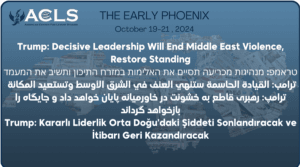TOP HEADLINES:
- White House Denies Role in Damascus Airstrike, Warns Tehran Against Retaliation
- Renewed Israel-Hamas Talks Pave Way for Safe Passages in Gaza
- Biden Criticizes Israel for Airstrike that Killed Relief Workers in Gaza
- UNIFIL Suspends Patrols Following Hizballah Attack on Peacekeepers
- Akram Imamoglu: Erdogan’s Political Threat
=======================
★ IRAN
White House Denies Role in Damascus Airstrike, Warns Tehran Against Retaliation
The White House stated it had no involvement in the recent airstrike on Iran’s embassy in Damascus, which resulted in the deaths of Iranian military personnel. National Security Spokesman John Kirby refuted Iran’s accusations of U.S. complicity, emphasizing the U.S. commitment to protecting its forces in the region and stating the US had no prior notification from Israel about the operation. The US firmly warned Iran against retaliating for the strike.
Iranian Press Slams Israeli Attack on Consulate as ‘Madness’, Call for Retaliation Against Israeli Diplomatic Facilities
Following a two-week Nowruz break, Iranian newspapers reacted strongly to Israel’s unprecedented attack on the Iranian consulate in Damascus, which also killed senior Revolutionary Guard commanders. The papers criticized Israel’s blatant aggression, interpreting it as an attempt to deter Iran and end its presence in Syria, dismissing Iranian threats as ineffective. Iranian media, reflecting internal criticism of the regime’s hesitant response to Israel, described the attack as an act of unprecedented madness. Meanwhile, an editorial in “Kayhan” argued that Israeli embassies worldwide are legitimate targets for Iran in response.
Iran’s Foreign Minister Discusses Israeli Attack on Syrian Consulate with UN Chief
The United Nations Secretary-General’s spokesperson, Stephen Dujarric, addressed efforts to prevent the Israeli strike on Iran’s Syrian consulate from escalating into a wider conflict. Iran’s Foreign Minister reached out to UN chief Antonio Guterres, emphasizing the need to curb tensions. The call preceded a UN Security Council emergency meeting on the Israeli attack in Damascus.
=======================
★ ISRAEL & PALESTINIAN TERRITORIES
Israel Says Target in Syria Was Military, Not Diplomatic
The Israeli military spokesperson, Daniel Hagari, stated that Israel’s recent strike in Damascus targeted a military facility of the Quds Force, part of the Iranian Revolutionary Guard, and not a diplomatic site. Contrary to claims by Syrian and Iranian officials of an attack on the Iranian embassy, Hagari said the target was a Quds Force military building disguised as a civilian facility. This clarification comes as Tehran has tried to stoke international condemnation and Israel is on high alert for potential retaliatory attacks. The strike resulted in the death of key personnel, including Iranian and Syrian military figures, with the death toll rising to 13 as of Wednesday.
Renewed Israel-Hamas Talks Pave Way for Safe Passages in Gaza
Following the resumption of prisoner exchange negotiations in Cairo, Israel and Hamas are reportedly making headway, with Israel showing flexibility on several issues. A proposal for three safe corridors for displaced persons to return to Northern Gaza is under consideration. Israeli negotiators, comprised of intelligence and military officials, have proposed mechanisms to monitor the status of Israeli hostages held by Hamas in Gaza. These understandings could open the way for north Gaza residents to begin to return home.
Fitch Maintains Israel’s A+ Rating, Ends Negative Watch Despite Ongoing Conflict
The Fitch rating agency has reaffirmed Israel’s A+ credit rating, removing the negative watch initiated in October due to the conflict with Hamas in Gaza. Despite acknowledging the high risks of escalation and ongoing geopolitical tensions, Fitch believes the impact assessment on Israel’s credit profile may take longer, warranting the stable outlook. However, the agency’s longer term outlook remains negative, reflecting uncertainties about fiscal paths and the conflict’s duration and intensity. Fitch warns of potential military spending increases and economic uncertainties, which could constrain Israel’s ability to reduce debt in the future.
Biden Criticizes Israel for Insufficient Protection of Relief Workers in Gaza, as IDF Chief Apologizes for “Accidental Killing”
President Joe Biden criticized Israel for a recent airstrike in Gaza that killed 7 relief workers, stating Israel had not done enough to protect those aiding Palestinians in need. Biden emphasized the need for a swift, transparent investigation ensuring accountability. He pledged continued pressure on Israel for more aid access to Gaza and an immediate ceasefire as part of a hostage deal. Israel admitted to a “serious mistake” in the airstrike, promising a thorough independent inquiry. Meanwhile, IDF Chief General Herzi Halevi apologized for the accidental killing of the aid workers and said that “Immediate actions will be taken to better protect humanitarian aid workers.” The IDF said the incident occurred due to a misidentification leading to the strike.
Fatah Rejects Iranian Interference in Palestinian Affairs, After Clashes Between Hamas and PA Forces
On Tuesday, the Fatah movement issued a statement rejecting external interference in Palestinian affairs, especially by Iran. The Fatah statement said Iranian meddling serves Israeli interests by fostering chaos among Palestinians. Fatah pledged to defend Palestinian national interests, security apparatus, and institutions from disruptive forces and expressed confidence in Palestinian security forces to counteract destabilizing interventions. The Fatah statement came after violent clashes between Hamas members and Palestinian security forces in the West Bank.
=======================
★ IRAQ
Iran-Backed Iraqi Militants Claim Attack on Haifa Airport in Israel
Iraqi armed groups claimed responsibility for a drone strike on Haifa Airport in Israel early Wednesday morning. The “Islamic Resistance in Iraq” vowed to continue targeting Israeli sites as part of their response to the ongoing conflict between Israel and Hamas in Gaza since October 7. Following the attack, the Israeli military activated warning sirens for potential threats in southern Israel, with media reports confirming the activation of the aerial intrusion alert system in the Arava Valley.
Iraqi Government Rejects Iran-Backed Militia’s Call for Arming of Jordanian Militants
The Iraqi foreign ministry told Arabic media that the Iraqi government will not tolerate any violation of Jordan’s sovereignty by Iraqi factions. An Iraqi official said the Iraqi government rejects a recent call by the pro-Iranian militia Kata’ib Hizballah to arm “resistance fighters” in Jordan. Meanwhile, Jordanian security institutions dismissed the Iraqi militia’s statement as mere media posturing, aimed at stoking regional tensions, and said the Jordanian security institutions had successfully thwarted attempts by militants to infiltrate Jordan.
Baghdad and Washington Continue Talks on US Military Withdrawal
A new round of dialogue between Baghdad and Washington, marking the fourth since last February, will focus on the withdrawal of U.S. troops and the end of the international coalition’s role against ISIS. The latest round of talks come ahead of Iraqi Prime Minister Mohammed Shia al-Sudani’s visit to the White House in the coming weeks. The talks face several challenges, including differing views on the withdrawal’s advisability, an unclear U.S. stance on a withdrawal timetable, and pressure from pro-Iran militias demanding a full withdrawal. The Iraqi government wants the discussions to evaluate whether the coalition’s presence is still necessary, seek a clear timeline for U.S. withdrawal, and define the nature of future American support for Iraq.
=======================
★ SYRIA
ISIS Attacks in Syrian Desert Have Killed More Than 90 People During Ramadan
Since the beginning of Ramadan, ISIS has intensified its operations in the Syrian desert, executing 32 attacks against regime forces, pro-regime militias, and civilians, resulting in approximately 90 fatalities. The targets have included military personnel and civilians gathering truffles, a seasonal source of income for many poor families. The distribution of attacks across various regions highlights the ongoing threat posed by ISIS, despite claims of its defeat. The Syrian Observatory for Human Rights has documented the continuing violence, emphasizing the group’s persistent presence and capability to inflict harm, challenging the notion that ISIS has been completely eradicated from Syria.
Russia Establishes Third Military Post on Golan Heights Border
Russian military police have set up an additional post near the demarcation line separating Israeli and Syrian forces in the Golan Heights, aiming to enhance monitoring along the “Bravo Line” and ensure adherence to the ceasefire. This move marks the third Russian deployment in the area since early this year. The initiative reflects Russia’s re-engagement in southern Syria after an expansion of the Iranian militia presence in the area and repeated Israeli airstrikes targeting these groups.
UN Envoy Condemns Attack on Iranian Consulate in Damascus
Geir Pedersen, the UN Special Envoy for Syria, condemned the attack on the Iranian Consulate in Damascus, warning of severe consequences for Syria and the wider region. He emphasized the importance of respecting the inviolability of diplomatic and consular buildings and their staff under international law. Pedersen urged all parties to adhere strictly to international law commitments, practice maximum restraint, and avoid further escalation to prevent a broader conflict with potentially grave implications.
Saudi Arabia Grants Syrian Hajj Committee Authority to Manage Pilgrimage Independently from Assad Regime
Saudi Arabia has authorized the Syrian High Hajj Committee to independently manage the Hajj pilgrimage for Syrians in northern Syria and Turkey, separate from the Syrian regime. This decision will facilitate the pilgrimage for Syrians residing outside regime control. The move follows Damascus’s announcement of Hajj registration for the first time in 12 years, revealing a quota distribution favoring the regime.
=======================
★ LEBANON
Fuel Prices Soar in Lebanon with Expectations of Further Increases
In Lebanon, gasoline prices have witnessed a significant hike today, with expectations for an upward trend in the coming days due to rising global oil prices and recent military developments in the region. The price of 95 and 98 octane gasoline increased by 28,000 Lebanese pounds, while diesel and gas saw reductions. This spike is linked to the international oil market and security concerns in the Red Sea and Russian oil facilities, alongside OPEC’s production cuts.
UNIFIL Suspends Patrols in Southern Lebanon Following Hizballah Attack on Peacekeepers
UN peacekeeping patrols (UNIFIL) in southern Lebanon have been suspended for three days following an assault on an international observer patrol (UNDOF) that injured three soldiers during ongoing exchanges of fire between Hezbollah and the Israeli military. The suspension came after a UN vehicle was targeted, resulting in injuries to three military observers and a Lebanese translator. Israeli forces said that a Hezbollah-planted roadside bomb was responsible for injuring the UN peacekeepers in southern Lebanon, contradicting Lebanese claims of an Israeli drone strike. The incident occurred near Rmeish on March 30, with initial reports mistakenly suggesting a drone attack on a UN vehicle. IDF spokesperson, Lt. Col. Avichay Adraee, provided clarification, while the United Nations Truce Supervision Organization (UNTSO) indicated the peacekeepers were on foot patrol when a shell exploded nearby, not in a vehicle as previously reported.
Lebanon to Postpone Municipal Elections for Third Consecutive Time
Lebanon’s parliament is poised to delay local elections for the third consecutive year, following previous delays due to scheduling conflicts with parliamentary elections in 2022 and financial constraints in 2023. This year’s postponement is attributed to the ongoing conflict between Israel and Hezbollah in southern Lebanon. Despite the lack of preparations for the electoral process, discussions among political factions indicate a parliamentary majority in favor of delay, with opposition from the Lebanese Forces, the Kataeb Party, and independent MPs who have consistently opposed the extension and advocated for electoral reforms.
=======================
★ YEMEN
Saudi-Omani Delegation Heads to Sana’a to Propose U.S. Peace Plan
A joint Saudi and Omani delegation is scheduled to visit Sana’a in the coming days to present a U.S. proposal aimed at halting Houthi attacks in the Red Sea, Arabian Sea, and Gulf of Aden. This initiative follows a roadmap for peace in Yemen, achieved through negotiations between Sana’a and Riyadh with Muscat’s mediation. The Americans have set conditions for implementing this peace plan, seeking an end to the conflict. The joint delegation’s visit follows meetings in the region with the U.S. special envoy for Yemen, Tim Lenderking.
=======================
★ GULF REGION
Aramco Awards $7.7 Billion for Gas Project Expansion
Saudi Aramco has allocated $7.7 billion for engineering, procurement, and construction contracts to significantly expand a major gas project. This expansion is set to increase the processing capacity at the Fadhili gas plant from 2.5 to about 4 billion standard cubic feet per day, with completion expected by November 2027. The project aims to boost natural gas supplies, reduce greenhouse gas emissions, and provide more crude oil for refining and export. The contracts were awarded to Samsung Engineering, GS Engineering & Construction, and Nesma & Partners, marking a strategic step towards Aramco’s goal of enhancing gas production and developing low-carbon hydrogen ventures.
UAE Suspends Humanitarian Aid Via Sea Passage to Gaza After Israeli Strike that Killed Aid Workers
The United Arab Emirates has temporarily halted its humanitarian aid efforts through the sea passage from Cyprus to Gaza following an Israeli airstrike that killed aid workers. A UAE official stated the suspension awaits further safety assurances and a comprehensive investigation into the deaths of workers from the World Central Kitchen in Gaza. The UAE, the main financier of this aid route, condemned the attack alongside other Gulf countries, emphasizing the need for an immediate end to violence and the protection of civilians and humanitarian institutions. The World Central Kitchen announced a pause in its Gaza operations, expressing shock over the airstrike despite coordination with the Israeli military, which has initiated an investigation into the incident.
UAE Private Sector Faces Production Strain Due to Red Sea Shipping Crisis
The UAE’s non-oil private sector is experiencing significant production pressures due to a sharp increase in backlogged work, similar to levels seen in June 2018, as reported by S&P Global’s Purchasing Managers’ Index. Administrative delays and tightened supply restrictions, stemming from the Red Sea shipping crisis, have led to record-high work accumulation last month. This situation has affected companies’ production capacities and delivery times, with the latter witnessing the weakest performance in a year. Despite a slight decrease from 57.1 in February to 56.9 in March, business conditions improved markedly in March, driven by a strong influx of new orders.
=======================
★ EGYPT AND NORTH AFRICA
Egypt Seeks €2 Billion Grant for Electrical Interconnection with Greece and Italy
Egyptian government sources say Cairo is prioritizing electrical connection projects with Italy and Greece and is in consultations with the European Union for a €2 billion grant to fund them. These projects aim to link Egypt’s power grid with Europe’s, supplying clean energy to Europe. Discussions with EU officials started months ago, with notable EU interest due to the projects’ reliance on clean energy and carbon emission reduction. Electrical interconnection projects are among the top priorities receiving EU support.
Egypt’s External Debt Rises Despite Increased Foreign Income
Egypt’s Ministry of Planning and Economic Development reported a 2.1% increase in external debt in Q2 of the current fiscal year, totaling $168.03 billion. The debt increased by $3.512 billion within three months, reaching $168.034 billion by December 2023. Economist Mamdouh Elweli notes Egypt’s external debt tripled in ten and a half years. Despite rising debt, Egypt’s foreign income totaled over $1.293 trillion in the past decade, averaging $129.284 billion annually.
=======================
★ TURKIYE
Akram Imamoglu: Erdogan’s Political Threat
Turkey’s opposition celebrated their victory in local elections this week, dealing a blow to President Erdogan’s party. Akram Imamoglu, of the Republican People’s Party, secured Istanbul’s mayoralty, symbolizing a shift in Turkish politics driven by economic challenges and security threats. Imamoglu’s win signals a formidable challenge to Erdogan’s dominance, positioning him as a key contender in upcoming presidential elections. A civil engineer and businessman, Imamoglu’s rise underscores a growing opposition to Erdogan’s rule, despite legal battles and Erdogan’s control over state institutions. Imamoglu’s ambitions could reshape Turkey’s political landscape, challenging Erdogan’s grip on power.
Türkiye Denies Seeking to Reestablish Ties with Israel
Türkish officials denied Israeli media claims suggesting Ankara is seeking to mend ties with Israel. The Center for Countering Disinformation dismissed these reports, citing Ankara’s consistent condemnation of Israel’s actions in Gaza and stating that Türkiye’s stance on the Palestinian cause remains unwavering. President Erdoğan, a vocal supporter of Palestine, canceled plans to visit Israel due to its “inhumane” actions.
Türkiye, U.S. Aim for $100 Billion Trade Target
U.S. Embassy officials in Ankara said that Türkiye and the United States aim to bolster cooperation, targeting a trade volume surpassing $100 billion. The U.S. officials said Türkiye’s strategic location attracts American companies and that current trade talks focus on collaboration opportunities such as renewable energy. With current U.S. investments in Türkiye reaching $50 billion, and Türkiye’s investments in the U.S. totaling $2.7 billion, both sides seek to revitalize trade agreements for further economic momentum.
=======================
📌 Incase you missed it,
📰 THE EARLY PHOENIX April 2 , 2024
📰 THE EARLY PHOENIX April 1 , 2024
🔗 Follow the latest news from the American Center for Levant Studies via Google News



